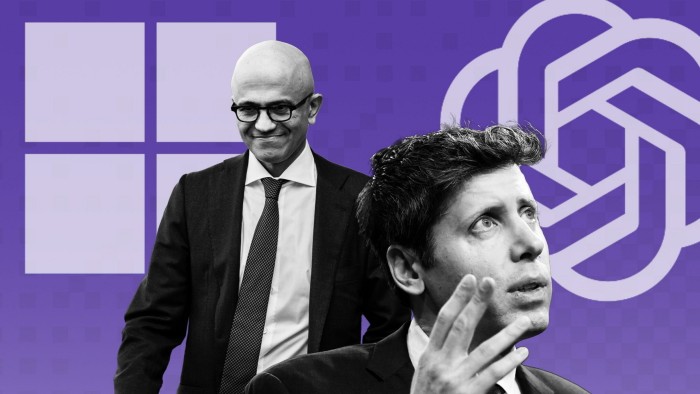Microsoft is prepared to walk away from high-stakes negotiations with OpenAI over the future of its multibillion-dollar alliance, as the ChatGPT maker seeks to convert into a for-profit company.
The software giant has considered halting complex discussions with the $300bn AI start-up if the two sides remain unable to agree on critical issues, such as the size of Microsoft’s future stake in OpenAI, according to people with knowledge of its plans.
In this eventuality, Microsoft would rely on its existing commercial contract to retain access to OpenAI’s technology until 2030, unless there was an offer that was equal to or better than its current arrangements, according to these people.
These people stressed, however, that Microsoft was operating in “good faith” and both parties were meeting daily to try to put a plan on the table and were hopeful a deal could be reached.
“We have a long-term, productive partnership that has delivered amazing AI tools for everyone,” Microsoft and OpenAI said in a joint statement. “Talks are ongoing and we are optimistic we will continue to build together for years to come.”
OpenAI needs a deal with Microsoft to complete a move away from its non-profit origins into a more conventional corporate structure, which it believes will unlock funding and launch an initial public offering.
Microsoft must approve the switch by the end of the year or OpenAI risks losing billions of funding from other investors, including SoftBank.
In discussions over the past year, the two sides have battled over how much equity in the restructured group Microsoft should receive in exchange for the more than $13bn it has invested in OpenAI to date. Discussions over the stake have ranged from 20 per cent to 49 per cent.
The pair are also revising the terms of its wider contract, first drafted when Microsoft invested $1bn into OpenAI in 2019.
Under its current arrangement, Microsoft has exclusive rights to sell access to OpenAI’s models and receives a 20 per cent share of revenues up to $92bn.
Microsoft is reluctant to give ground on its continued access to OpenAI’s technology or its share of the group’s revenues, according to multiple people close to the discussions.
The Wall Street Journal reported this week that OpenAI had considered a “nuclear option” of accusing Microsoft of anti-competitive behaviour over its partnership.
“Holding out is Microsoft’s nuclear option . . . and they are just making OpenAI sweat,” said one person close to OpenAI, who also argued access to the ChatGPT maker’s IP was necessary for Microsoft to maintain its position in the race to commercialise AI against rivals such as Google and Meta.
One person close to Microsoft said the “status quo” was acceptable for the Big Tech company and that it was “happy with the current contract” and prepared to “run it through” until 2030.
“The market cares about how much revenue Microsoft is making . . . not about how much equity it owns in OpenAI, [and] this deal moves revenue away from Microsoft,” said another person who has discussed the negotiations with Microsoft executives.
“The question is, what does Microsoft get in return for giving up the right to that revenue?”
Microsoft has already begun diversifying away from OpenAI models in recent months, as part of chief executive Satya Nadella’s belief that leading models will become “commoditised” — or have less value than being able to sell AI-enabled applications and digital assistants built on top of them.
In May, the software giant made Elon Musk’s xAI model Grok available to its cloud computing customers.
“OpenAI is not necessarily the frontrunner anymore,” said one person close to Microsoft, remarking on the competition between rival AI model makers.
Several other elements of the current contract are also up for negotiation, including Microsoft’s exclusive rights to sell OpenAI’s software through its Azure cloud computing service; its right of first refusal to provide computing infrastructure to OpenAI; and the software giant’s access to the AI group’s intellectual property before it reaches “artificial general intelligence”.
The latter clause refers to a point where OpenAI creates a “highly autonomous system that outperforms humans at most economically valuable work” and is likely to be dropped, as the Financial Times previously reported.
OpenAI’s chief executive Sam Altman and its chief financial officer Sarah Friar have also said the company is struggling to access the computing power needed to run ChatGPT, which has raced to 500mn weekly active users worldwide, while also training new models and launching products.
Two former Microsoft executives involved in managing OpenAI’s compute requirements said the relationship between the groups had frayed significantly over the issue, particularly around Altman’s demands for faster access to even more infrastructure.
Even if the issues are resolved, the transaction will have to be approved by attorneys-general in Delaware and California. The conversion is also subject to a legal challenge from xAI chief Musk, which has been supported by former OpenAI employees.
For OpenAI, getting an agreement with Microsoft is crucial. Investors in the AI group’s past two financing rounds have agreed to provisions that require the company to successfully convert into a for-profit entity or their equity investment becomes debt.
Should this process be delayed or abandoned, investors have the option to claim some of their investment back. SoftBank, which led the most recent round, could cut its $30bn investment by $10bn if the conversion is not completed by the end of the year. People close to OpenAI are confident that investors would retain their commitments, even if the transaction was delayed.
A Silicon Valley veteran close to Microsoft said the software giant “knows that this is not their problem to figure this out, technically, it’s OpenAI’s problem to have the negotiation at all”.



